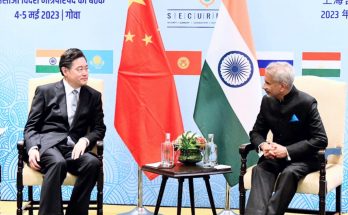 BEIJING: Against the backdrop of the impending drawdown of foreign combat troops from Afghanistan, China has sought closer cooperation with India in combating terrorism and promoting peace and stability in the violence-stricken country.
BEIJING: Against the backdrop of the impending drawdown of foreign combat troops from Afghanistan, China has sought closer cooperation with India in combating terrorism and promoting peace and stability in the violence-stricken country.
“This is a very important year for Afghanistan. Therefore, peace and stability is critical to the reconstruction of Afghanistan and future of the region,” Mr Hong Lei, a spokesperson of China’s Ministry of Foreign Affairs, said in response to a question from India Writes Network (www.indiawrites.org). He was interacting with a group of senior Indian editors and journalists in Beijing.
 “The common purpose of India and China is to jointly safeguard regional peace and stability,” he said. In a formulation that is close to India’s stance, Mr Hong underlined that China backed an Afghan-led and Afghan-owned national reconciliation process in Afghanistan.
“The common purpose of India and China is to jointly safeguard regional peace and stability,” he said. In a formulation that is close to India’s stance, Mr Hong underlined that China backed an Afghan-led and Afghan-owned national reconciliation process in Afghanistan.
Mr Hong’s remarks came soon after Chinese Foreign Minister Wang Yi’s visit to Afghanistan February 24, an important trip that underlined China’s growing stakes in ensuring peaceful transition in Afghanistan in 2014 and in the transformational decade beyond.
During his visit to Kabul, the Chinese minister had stressed that Beijing was ready to play a constructive role in Afghanistan to achieve political reconciliation and economic revival.
Mr Wang also assured his Afghan hosts that China will continue to provide training and assistance to Afghan security forces, which will take over security of the country after the US and Nato troops leave this country in a phased withdrawal.
Common Concerns
A host of strategic and economic factors are propelling India and China to seek closer cooperation in Afghanistan. Against the backdrop of a growing congruence of interests, India and China held their first focused stand-alone dialogue in April 2013. This dialogue on Afghanistan, led by senior officials handling the region, is poised to acquire greater traction in 2014 and beyond as the Asian powers find mutual advantages in closely cooperating to sustain Afghanistan as a narrative of opportunity rather than a hub of chronic violence, extremism and instability.
The withdrawal of the US and Nato forces from Afghanistan in 2014, and the fears of a Taliban takeover, have acted as a key driver of the emerging India-China understanding on Afghanistan. China shares India’s anxiety over the return of the Taliban and its kindred al-Qaeda and hardline Islamist networks to power in Kabul, concerns that have been sharpened after the recent terror attack in Kunming, which is being blamed on Uighyur separatists in Xinjiang.
China is apprehensive that a Taliban-dominated dispensation in Kabul will fuel the militant networks in the Muslim-majority restive province of Xinjiang. There are reports of linkages between the separatist group, the East Turkestan Islamic Movement, led by ethnic Uighurs and al-Qaeda and Taliban-affiliated outfits in Afghanistan. This is a major security anxiety of China, and with the new Chinese leadership showing assertiveness on the sovereignty issue, the Chinese leadership can be expected to be more proactive on Afghanistan and forge suitable arrangements with regional players to ensure stability and security of Afghanistan.
 For India, a Taliban-dominated dispensation in Kabul is bad news as it could threaten a host of India-aided reconstruction projects in Afghanistan and directly impinges on the security of the country. India has pledged over two billion dollars for multifarious reconstruction projects ranging from building roads, bridges and power stations to construction of the Afghan parliament.
For India, a Taliban-dominated dispensation in Kabul is bad news as it could threaten a host of India-aided reconstruction projects in Afghanistan and directly impinges on the security of the country. India has pledged over two billion dollars for multifarious reconstruction projects ranging from building roads, bridges and power stations to construction of the Afghan parliament.
A Narrative of Opportunity
Besides the security imperative, both India and China have crucial economic stakes in the stability and prosperity of Afghanistan. The two countries see Afghanistan as the land of opportunity, which offers huge prospects in resource and infrastructure sectors. According to some estimates, Afghanistan has a mind-boggling array of mineral resources estimated to be over $1 trillion.
In fact, China has emerged as the biggest foreign investor in Afghanistan with lucrative energy and resource deals under its belt, including a $3.5 billion contract to develop the largest copper field in the world in the Aynak mine in Logar Province in Afghanistan. China is looking to scale up its investments in Afghanistan, and feels that it will benefit from goodwill reaped by India’s reconstruction projects.
 India has taken the lead in positioning Afghanistan as a narrative of opportunity – a key theme of the first international investment conference on Afghanistan it hosted on its soil in June 2012. Indian companies have acquired some blocks in the Hajigak iron ore mines in Afghanistan, estimated to possess the world’s largest iron ore reserves.
India has taken the lead in positioning Afghanistan as a narrative of opportunity – a key theme of the first international investment conference on Afghanistan it hosted on its soil in June 2012. Indian companies have acquired some blocks in the Hajigak iron ore mines in Afghanistan, estimated to possess the world’s largest iron ore reserves.
India also looks at Afghanistan as a gateway to Central Asia and a hub of regional prosperity. Against this backdrop, India’s policy makers see many advantages of cooperating with China as Beijing wields considerable influence over its ally Pakistan, which in turn remote controls some of Taliban-linked militant outfits which can jeopardise India’s vital national interests in that country. India, China and Russia are also cooperating in the trilateral RIC format for stabilising Afghanistan.
(Manish Chand is Editor-in-Chief of India Writes (www.indiawrites.org), an e-magazine and journal focused on international affairs)
Author Profile

- Manish Chand is Founder-CEO and Editor-in-Chief of India Writes Network (www.indiawrites.org) and India and World, a pioneering magazine focused on international affairs. He is CEO/Director of TGII Media Private Limited, an India-based media, publishing, research and consultancy company.
Latest entries
 India and the WorldMarch 3, 2024India-Denmark Connect: Red carpet for Indians to Red Sea cooperation
India and the WorldMarch 3, 2024India-Denmark Connect: Red carpet for Indians to Red Sea cooperation India and the WorldFebruary 17, 2024Munich Security Conference: Jaishankar, Blinken focus on Red Sea, Middle East
India and the WorldFebruary 17, 2024Munich Security Conference: Jaishankar, Blinken focus on Red Sea, Middle East India and the WorldFebruary 14, 2024Munich Security Conference report: Migration, war top security threats
India and the WorldFebruary 14, 2024Munich Security Conference report: Migration, war top security threats India and the WorldJanuary 23, 2024With “Ram to Rashtra” mantra, Modi consecrates Ram temple for national renewal
India and the WorldJanuary 23, 2024With “Ram to Rashtra” mantra, Modi consecrates Ram temple for national renewal







